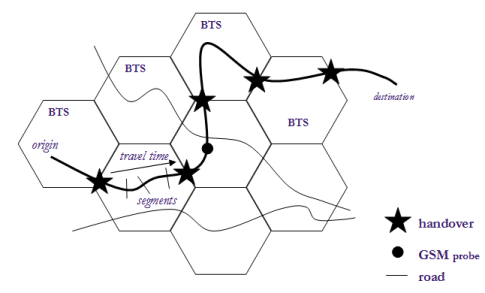CFVD
06.06 / 06.24
2006
TML validated the usability of Cellular Floating Vehicle Data technology for obtaining travel times and traffic information in Antwerp by comparing it with loop detectors and GPS data. The study evaluated the performance of this technology based on several independent traffic data sources to assess its reliability for future applications.
Obtaining accurate and reliable traffic information on a road network is a discipline undergoing constant evolution, with all kinds of techniques being used worldwide. In this study, we looked at a method of deriving journey times based on mobile phone information. The technique relies on the Cellular Floating Vehicle Data (CFVD) technology patented by ITIS Holdings. It focuses on the exchange of information between mobile phones and fixed antenna masts.
Our study included a validation that estimated the usefulness of the CFVD technology with respect to obtaining travel times and traffic status information. To achieve this, we compared the results of the CFVD technology with two other traffic measurements: data obtained from single loop detectors embedded in the road surface and observations made during test drives with a vehicle equipped with a GPS receiver. This allowed us to evaluate the performance of the CFVD technology using several independent data sources.
The validation was done for the CFVD technology as implemented in the Antwerp region during October 2006. The study area covers a zone consisting of all motorways and major regional and urban roads in the vicinity of the city.
Obtaining accurate and reliable traffic information on a road network is a discipline undergoing constant evolution, with all kinds of techniques being used worldwide. In this study, we looked at a method of deriving journey times based on mobile phone information. The technique relies on the Cellular Floating Vehicle Data (CFVD) technology patented by ITIS Holdings. It focuses on the exchange of information between mobile phones and fixed antenna masts.
Our study included a validation that estimated the usefulness of the CFVD technology with respect to obtaining travel times and traffic status information. To achieve this, we compared the results of the CFVD technology with two other traffic measurements: data obtained from single loop detectors embedded in the road surface and observations made during test drives with a vehicle equipped with a GPS receiver. This allowed us to evaluate the performance of the CFVD technology using several independent data sources.
The validation was done for the CFVD technology as implemented in the Antwerp region during October 2006. The study area covers a zone consisting of all motorways and major regional and urban roads in the vicinity of the city.


